Personalized recovery plans are fundamental for successful treatment outcomes. Tailoring approaches to individual needs boosts engagement and long-term adherence.
Here at Ona Treatment Center, we create customized recovery plans to address unique challenges effectively. This ensures each individual’s journey towards recovery is as supportive and successful as possible.
Why Personalize Recovery Plans
Personalized recovery plans are non-negotiable for achieving meaningful outcomes in addiction treatment. They cater to the individual’s specific needs, driving engagement and improving long-term results.
Tailoring Treatment to Individual Needs
Every individual’s experience with addiction is distinct. Factors like personal history, mental health, and social environment shape each person’s journey. A one-size-fits-all approach is inadequate. At Ona Treatment Center, we incorporate thorough assessments of each individual’s triggers, strengths, and challenges to craft tailored plans. This strategy ensures that therapeutic interventions are not just effective but also relevant.
Boosting Engagement and Compliance
Engagement is a critical predictor of recovery success. Studies show that patient engagement is key to successful recovery. When individuals recognize the elements of their personalized plan as directly applicable to their lives, they’re more motivated to adhere to it. Effective engagement in recovery activities, such as attending therapy sessions or practicing coping strategies, fosters a sense of ownership over the recovery process. Incorporating commitments to personal milestones, like family events or career goals, within the recovery plan further reinforces adherence and accountability.
Ensuring Long-Term Outcomes
Long-term sobriety requires a strategic approach. Personalized recovery plans are linked with better long-term outcomes and lower relapse rates. According to recent trends, integrating technology such as real-time monitoring devices can support ongoing recovery by providing continuous feedback and alerts to both patients and healthcare providers. Including self-care routines, like proper nutrition and exercise, and developing robust coping mechanisms can help individuals remain resilient in their recovery journey. Monitoring progress and setting realistic, attainable goals keep motivation high and provide measurable indicators of success.
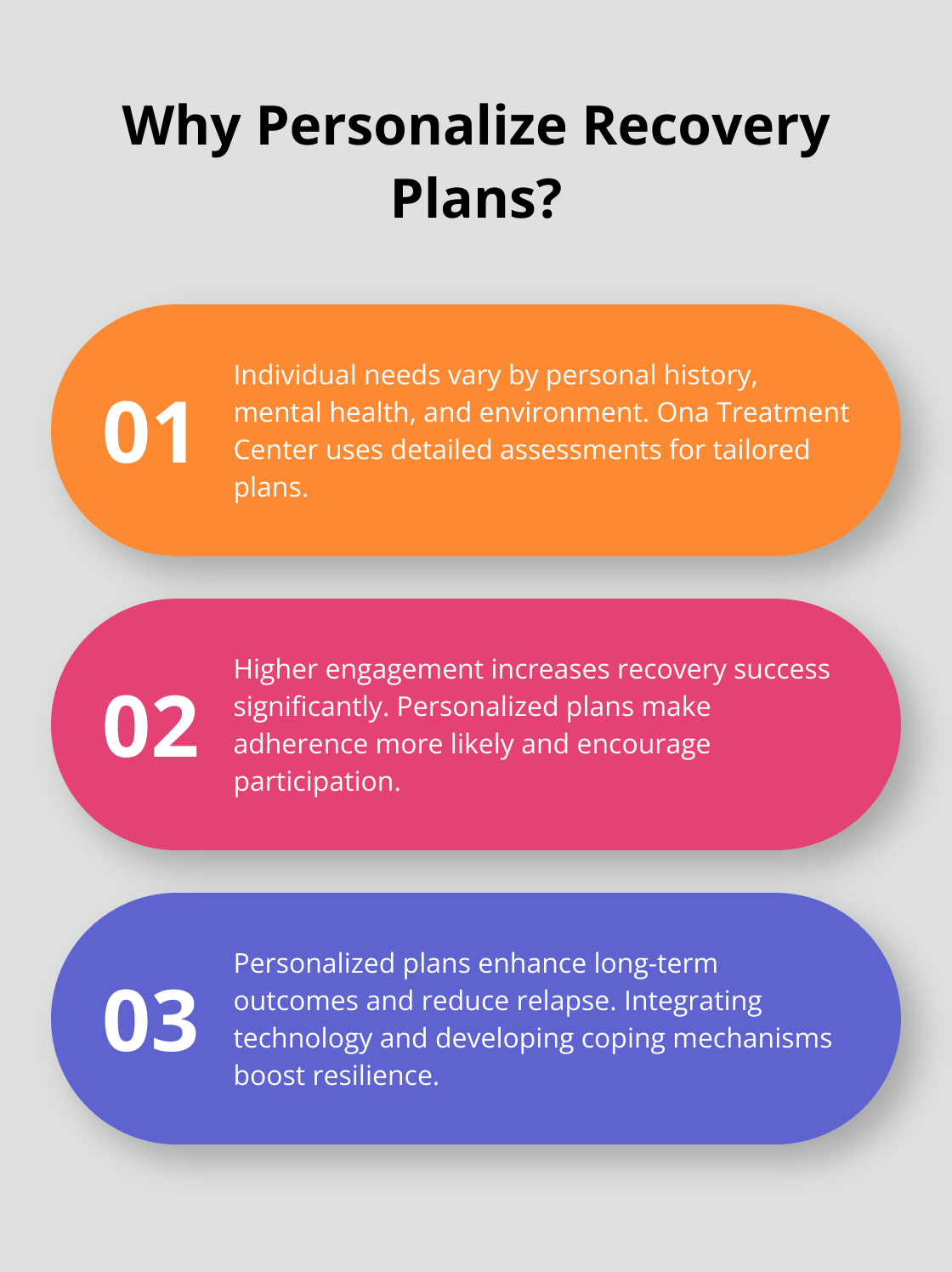
By aligning treatment strategies with specific needs and life contexts, personalized plans lay the groundwork for effective and sustainable recovery, setting the stage for the next steps in the journey.
What Makes a Recovery Plan Effective
Crafting an effective recovery plan involves several actionable components designed to cater directly to individual needs and circumstances. Here are the key elements that make personalized recovery plans highly effective.
Comprehensive Assessment and Diagnosis
An effective recovery plan begins with a thorough assessment of an individual’s current state. This includes evaluating their mental and physical health, identifying specific triggers, and understanding their personal and social history. By taking the time to conduct a detailed assessment, we can pinpoint the root causes of addiction and tailor interventions accordingly. This step also involves diagnostic tests to assess any co-occurring disorders, as untreated mental health issues significantly increase the risk of relapse.
Setting Realistic and Measurable Goals
Setting attainable goals is fundamental. We emphasize creating specific, measurable, achievable, relevant, and time-bound (SMART) goals. Goals could include milestones like attending a set number of therapy sessions, achieving certain physical health benchmarks, or developing new coping skills. Regularly monitoring progress towards these goals keeps patients motivated and provides clear indicators of success.
Incorporating Multidisciplinary Approaches
Addressing addiction from multiple angles is critical. Our approach involves integrating various disciplines such as medical treatment, psychological support, and social services. Evidence shows that multidisciplinary interventions are more effective in treating addiction. For example, combining medication-assisted treatment with cognitive-behavioral therapy can significantly reduce substance use over time. Involving family therapy can also enhance support systems, providing an additional layer of accountability. Holistic elements like nutrition counseling, exercise programs, and mindfulness practices bolster overall well-being and resilience against relapse.
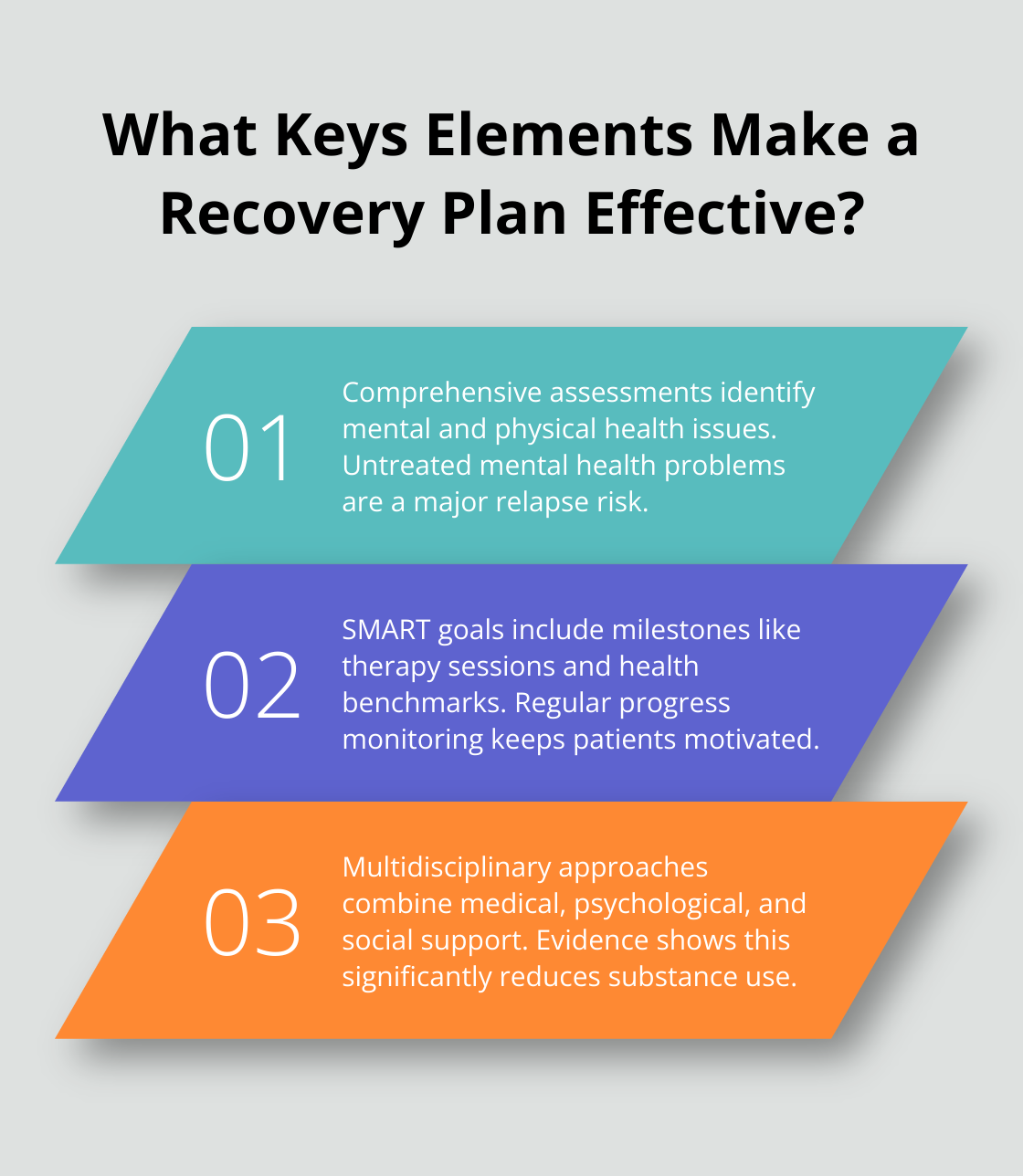
By focusing on comprehensive assessments, setting SMART goals, and leveraging multidisciplinary approaches, personalized recovery plans provide the structure and support necessary for a successful and sustained recovery journey.
What Are Examples of Successful Personalized Recovery Plans?
Case Study: Substance Abuse Recovery Success
Consider John, a 35-year-old battling opioid addiction for over a decade. Prior to joining Ona Treatment Center, conventional treatments yielded minimal results. However, with a personalized recovery plan focusing on John’s unique triggers and coping mechanisms, his journey took a transformative turn.
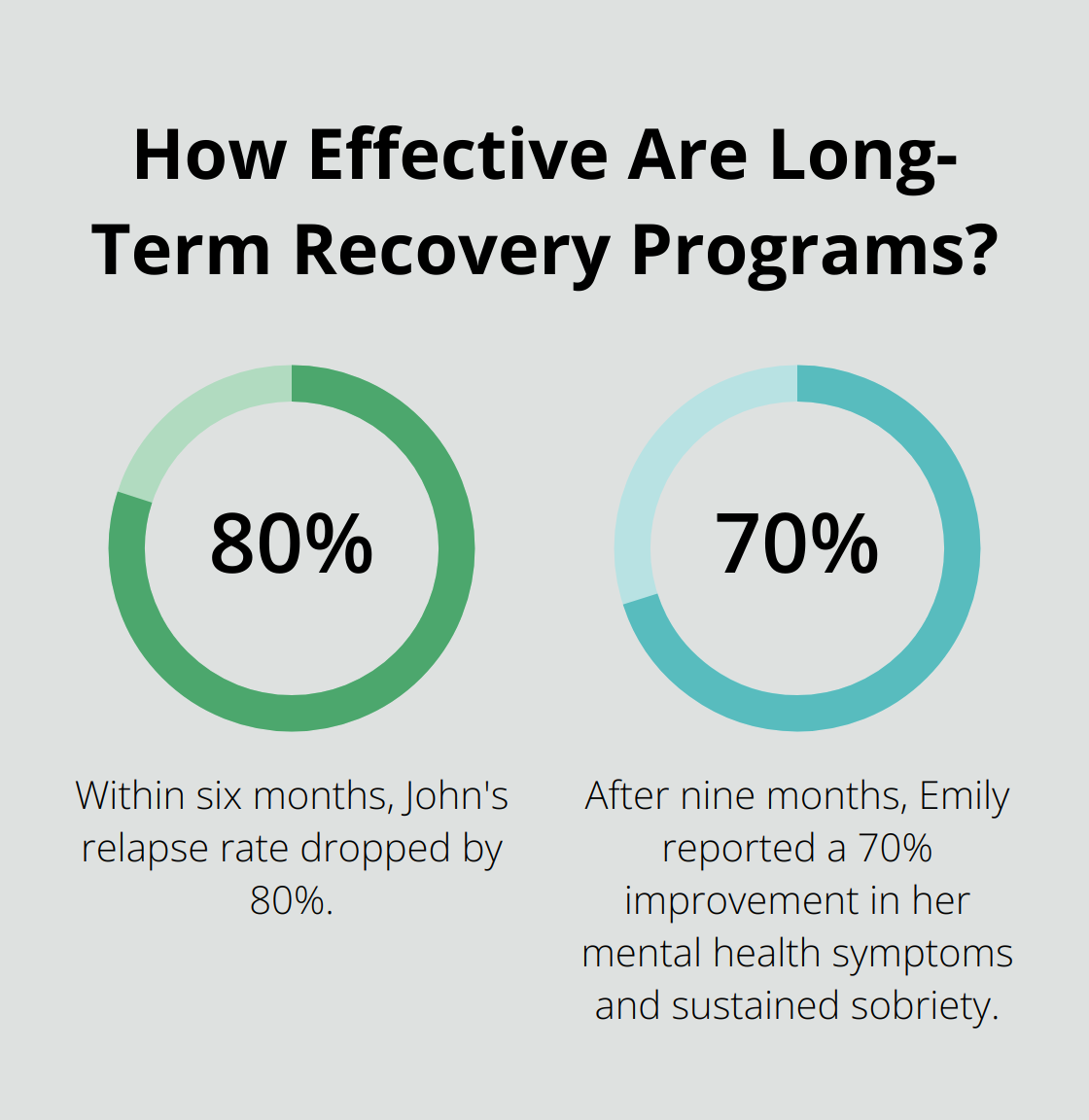
John’s plan was tailored to address his primary triggers—work stress and social environments where substance use was common. Through regular cognitive-behavioral therapy sessions, he learned effective coping strategies tailored to his specific stressors. Incorporating technology, a real-time monitoring device tracked his cravings, allowing instant support intervention. Johns’ engagement with a support group, aligned with his personal interests in fitness, created a community of accountability. Within six months, Johns’ relapse rate dropped by 80%, demonstrating the efficacy of individualized recovery strategies.
Case Study: Mental Health Recovery Journey
Emily, a 28-year-old struggling with anxiety and depression, had previously failed to find lasting relief. At Ona Treatment Center, her personalized recovery plan integrated mental health and addiction treatment, addressing her specific needs as an individual with dual diagnoses.
Her plan included a combination of medication management for her anxiety, alongside psychotherapy to tackle underlying issues leading to her substance use. Incorporating art therapy and mindfulness practices, Emily found new ways to express her emotions and manage stress. Regular virtual check-ins provided continuous support, enhancing her commitment to the recovery process. After nine months, Emily reported a 70% improvement in her mental health symptoms and sustained sobriety, evidencing the impact of a comprehensive, tailored approach.
Tools and Techniques Used in Effective Plans
Effective personalized recovery plans often utilize a blend of innovative and traditional tools tailored to each individual’s needs. Advanced monitoring devices, such as wearable tech, provide real-time feedback on physiological markers, allowing instant response to potential relapse triggers. For instance, tracking heart rate variability can predict anxiety spikes, prompting timely therapeutic interventions.
Incorporating telemedicine has proven increasingly beneficial, particularly in providing continuous support and reducing geographical barriers. Regular virtual check-ins, as seen with Emily, enhance engagement and adherence, offering flexibility and consistent care.
Additionally, integrating holistic practices like yoga, nutrition counseling, and mindfulness strengthens overall well-being. These practices are not merely supplemental but foundational, offering patients sustainable strategies for stress management and overall health maintenance.
By employing an array of tailored techniques and tools, we ensure that personalized recovery plans at Ona Treatment Center are robust, effective, and adaptable to each individual’s journey towards lasting recovery.
Conclusion
Personalized recovery plans offer a multitude of benefits, leading to more successful treatment outcomes. Tailoring each plan to the individual’s specific needs bolsters engagement, compliance, and ultimately, long-term sobriety. At Ona Treatment Center, we emphasize a comprehensive approach, incorporating detailed assessments, SMART goal setting, and multidisciplinary strategies to ensure effective and sustainable recovery journeys.
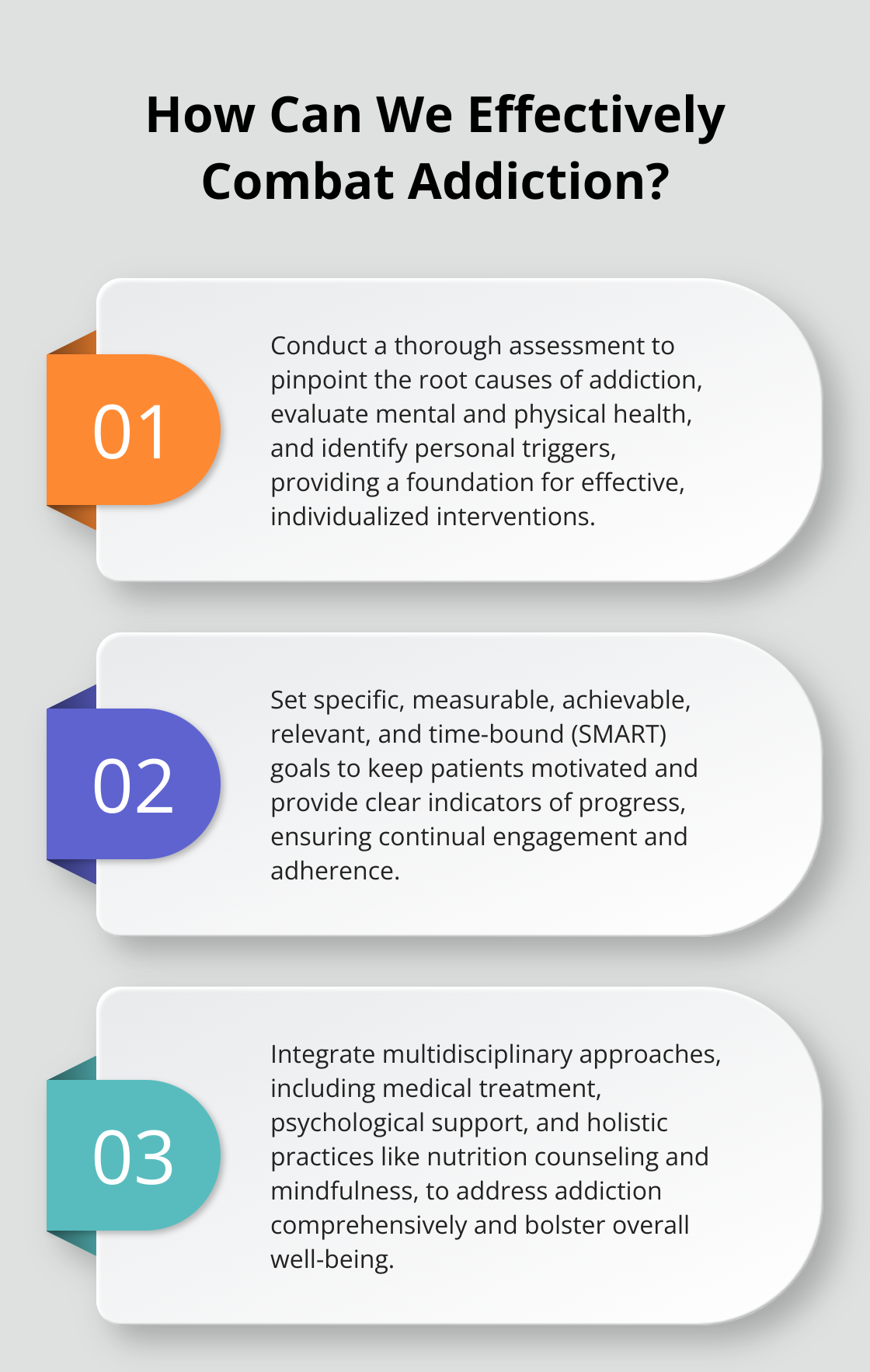
Case studies like John’s and Emily’s illustrate how personalized recovery plans can transform lives by addressing unique triggers and leveraging tailored interventions. For John, a structured plan that pinpointed his stressors and incorporated real-time monitoring devices significantly reduced his relapse rate. Emily’s plan, which integrated mental health treatment and addiction therapy, led to marked improvements in her mental health and sustained sobriety.
Implementing personalized approaches in addiction treatment is essential for achieving meaningful outcomes. For those seeking to start or enhance their recovery journey, Ona Treatment Center provides an exemplary model. Our evidence-based Living in Balance program, set in the serene surroundings of Northern California, offers holistic, individualized care. From tailored treatment plans and various therapies to life skills development and a supportive community, our center ensures a comprehensive continuum of care, facilitating a smooth transition back to everyday life.
Experience the benefits of a personalized recovery journey with us at Ona Treatment Center and take the first step towards a brighter future.
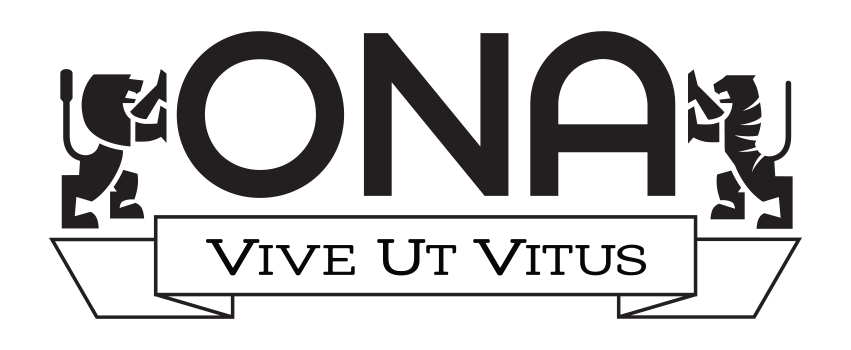

![Personalized Recovery Plans [Pro Tips]](https://onatreatmentcenter.com/wp-content/uploads/Personalized_Recovery_Plans__Pro_Tips__2024_06_27_07_10_52_159353_00_00.jpeg)



